Energy Efficiency
Four Essential Steps for Efficient Heat Pump Installation

At our firm, we’re committed to the significance of installing heat pumps proficiently. For this reason, we’ve established a four-step process designed to guarantee optimal functionality.
From sizing and selection to installation and testing, we take pride in our attention to detail.
By following these steps, we guarantee a reliable and efficient heat pump system that will serve you for years to come.
Let us guide you through this process and provide you with the utmost satisfaction.
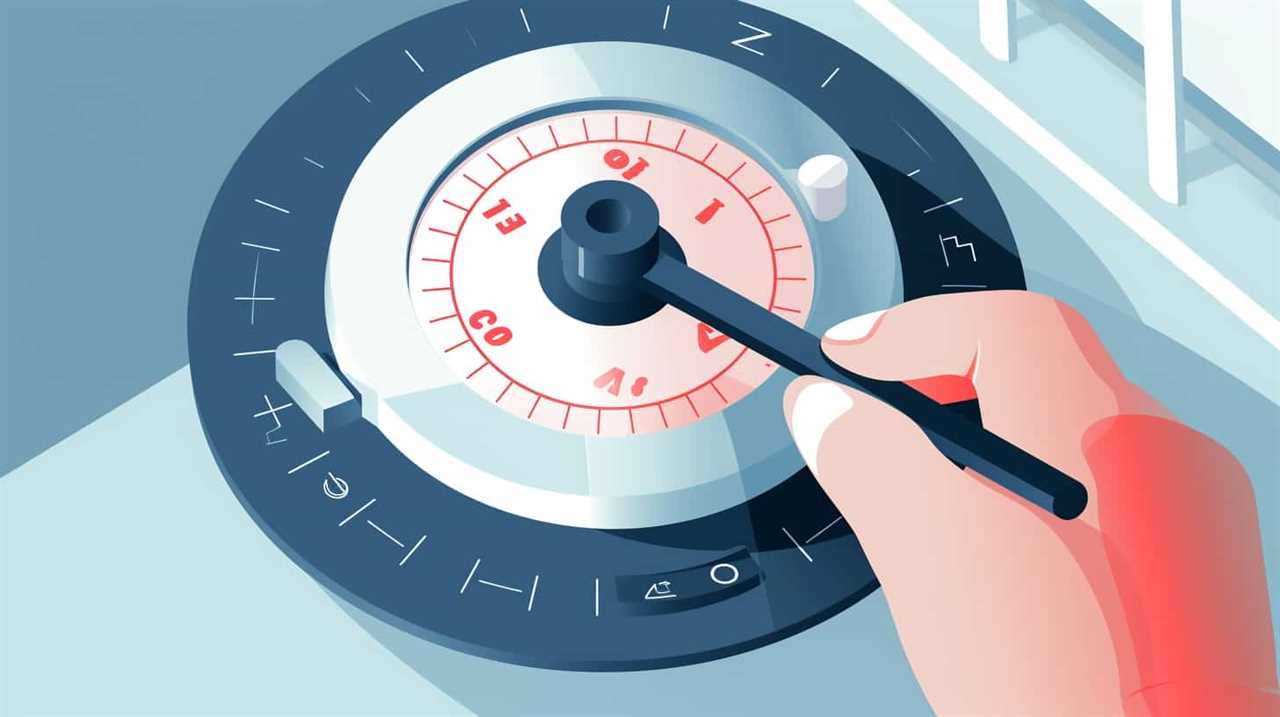
Key Takeaways
- Proper sizing and selection of the heat pump is crucial for efficiency and energy savings.
- Conduct a thorough site assessment and prepare the installation area for optimal performance.
- Follow manufacturer’s instructions and properly install and connect all components.
- Thoroughly test, commission, and regularly maintain the heat pump to ensure efficient operation and longevity.
Step 1: Proper Sizing and Selection of Heat Pump
We need to ensure that we properly size and select the heat pump for optimal efficiency. When it comes to heat pump efficiency, proper sizing and selection are crucial.
A heat pump that’s too small for the space it needs to heat or cool will struggle to maintain the desired temperature, leading to increased energy consumption and decreased efficiency. On the other hand, a heat pump that’s too large will cycle on and off more frequently, wasting energy and reducing its overall efficiency.
To determine the right size heat pump for your needs, it’s important to consider factors such as the size of the space, insulation levels, and climate conditions. Additionally, selecting a heat pump with a high energy efficiency rating can further enhance its efficiency and help save on energy costs.
Step 2: Preparing the Installation Site
Before beginning the installation process, it’s important to prepare the site properly. To ensure a successful heat pump installation, the following steps should be taken:
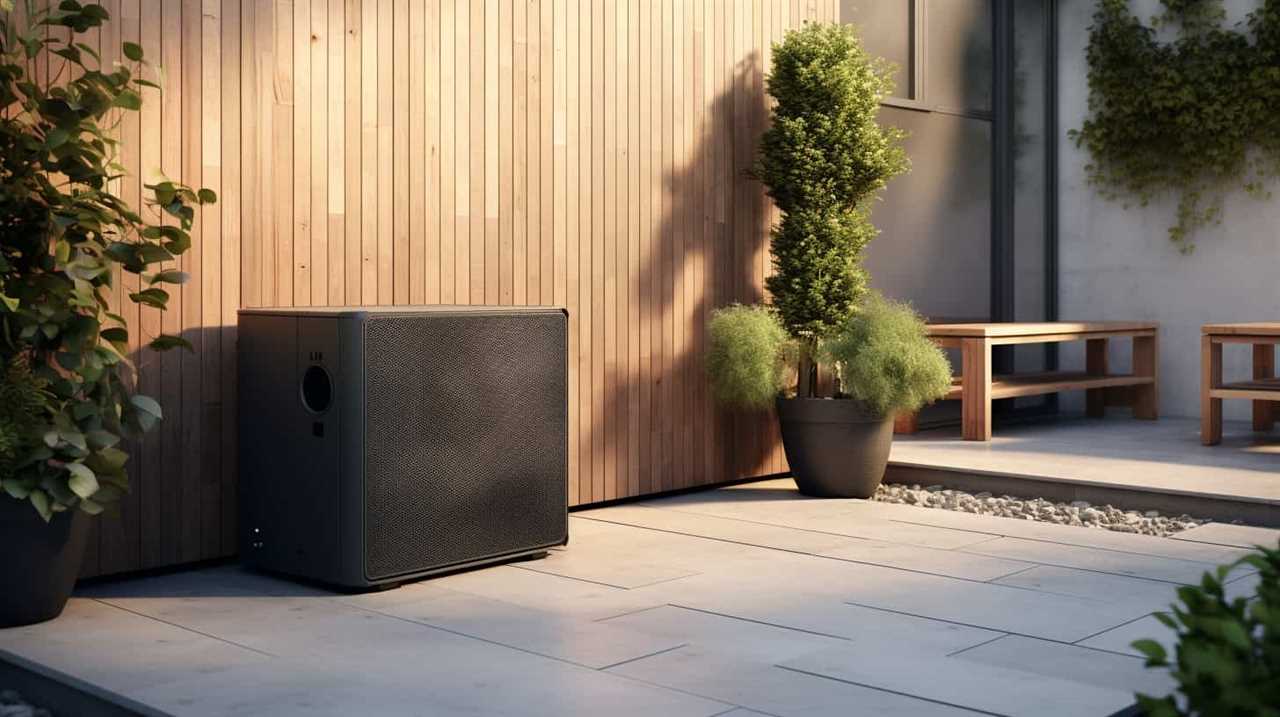
-
Conduct a thorough site assessment: This involves evaluating the space available, including the dimensions of the area and any potential obstructions. It’s crucial to consider factors such as accessibility, ventilation, and electrical connections.
-
Clear the installation area: Remove any debris, vegetation, or objects that may obstruct the installation process. This will help create a safe and clean environment for the installation team.
-
Determine optimal equipment positioning: Based on the site assessment, decide on the best location for the heat pump. Consider factors such as noise levels, aesthetics, and proximity to indoor and outdoor units.
-
Prepare the foundation: Ensure a stable and level surface for the heat pump’s outdoor unit. This may involve pouring a concrete pad or using a prefabricated mounting platform.
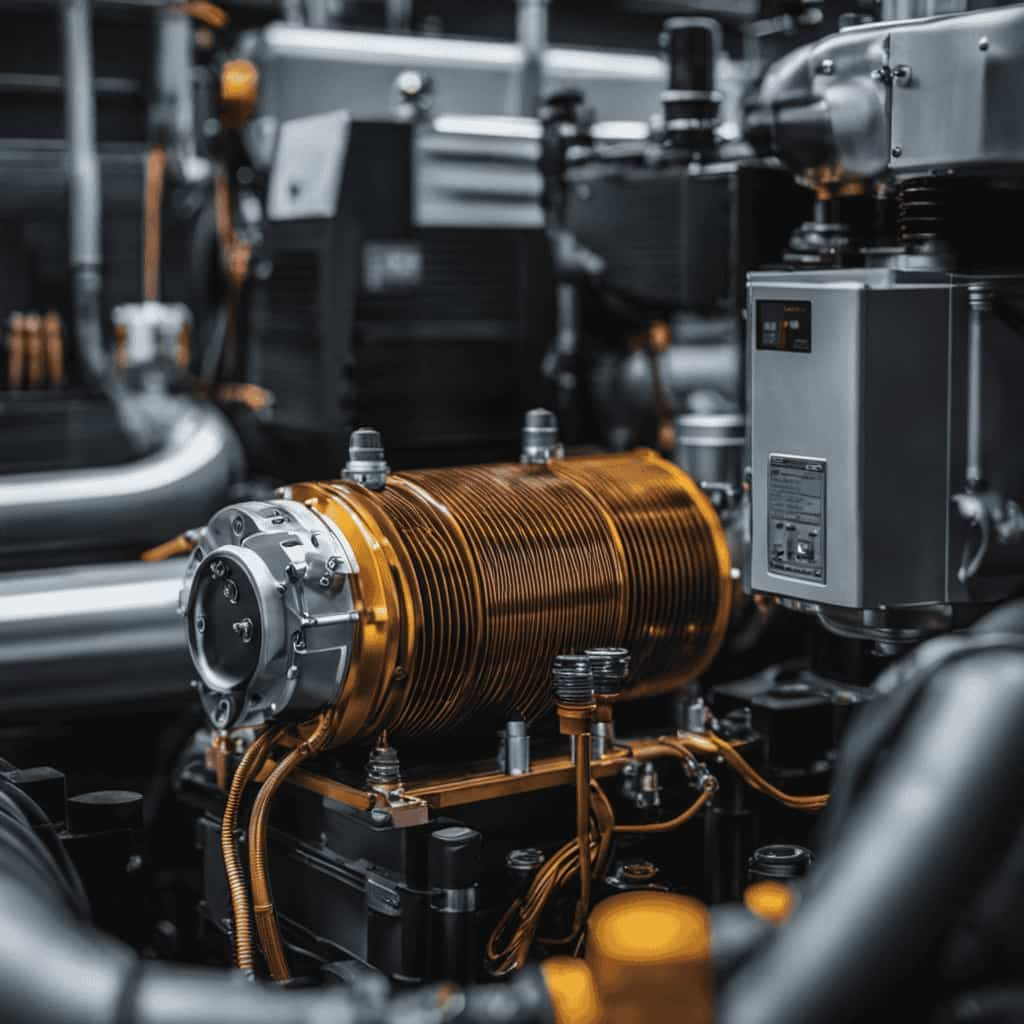
Step 3: Correct Installation and Connection of Components
To ensure proper installation and connection of components, we must carefully follow the manufacturer’s instructions and use the appropriate tools. When it comes to proper wiring, it’s crucial to consult the wiring diagram provided by the manufacturer. This diagram will guide us in connecting all the electrical components correctly. We must pay close attention to the color-coding of the wires and ensure they’re securely fastened. Any loose connections can lead to inefficient operation or even system failure.
Component positioning is another critical aspect of the installation process. It’s essential to position each component in the optimal location to maximize efficiency and performance. The heat pump unit should be placed in an area with good airflow and away from any obstructions. The indoor and outdoor units should be positioned at the appropriate distance from each other as specified by the manufacturer. This ensures proper airflow and reduces the risk of heat transfer issues.
Step 4: Thorough Testing and Commissioning
Once all the components have been installed and connected correctly, the next step is to thoroughly test and commission the heat pump system. This commissioning process ensures that the system operates efficiently and reliably.
Here are the testing procedures that we follow:

- We check for any leaks in the refrigerant lines using a refrigerant leak detector.
- We measure the airflow and adjust it if necessary to ensure optimal performance.
- We verify the accuracy of temperature sensors and adjust them if needed.
- We test the system’s defrost cycle to ensure it functions properly.
Thoroughly testing and commissioning the heat pump system is crucial to ensure its proper operation and to identify any potential issues. By following these testing procedures, we can ensure that the system is working efficiently and effectively.
In the next section, we’ll discuss ‘Step 5: Regular Maintenance and Monitoring’ to ensure the long-term performance of the heat pump system.
Step 5: Regular Maintenance and Monitoring
We regularly maintain and monitor the heat pump system to ensure its optimal performance and identify any potential issues. Regular maintenance is crucial for the longevity and efficiency of the heat pump. By following a regular maintenance schedule, we can prevent costly breakdowns and ensure the system operates at its peak efficiency. During maintenance, we inspect and clean the heat pump components, such as the filters, coils, and fans, to remove any dirt or debris that can hinder performance. We also check the refrigerant levels and electrical connections to ensure proper operation. Additionally, we emphasize the importance of monitoring the system’s performance through regular check-ups and data analysis. This allows us to detect any abnormal patterns or potential issues and address them promptly, minimizing downtime and maximizing customer satisfaction.
| Maintenance Tasks | Frequency | Importance |
|---|---|---|
| Inspection and cleaning of components | Quarterly | Ensures optimal performance and efficiency |
| Checking refrigerant levels and electrical connections | Annually | Prevents system malfunctions and breakdowns |
| Monitoring system performance and analyzing data | Regularly | Identifies potential issues and allows for timely repairs |
| Adjusting settings and calibrating controls | As needed | Optimizes system operation for energy savings |
Regular maintenance and monitoring are essential for the continuous and reliable operation of heat pump systems. By adhering to a regular maintenance schedule and closely monitoring the system’s performance, we can ensure that the heat pump functions efficiently, extends its lifespan, and provides optimal comfort for our valued customers.
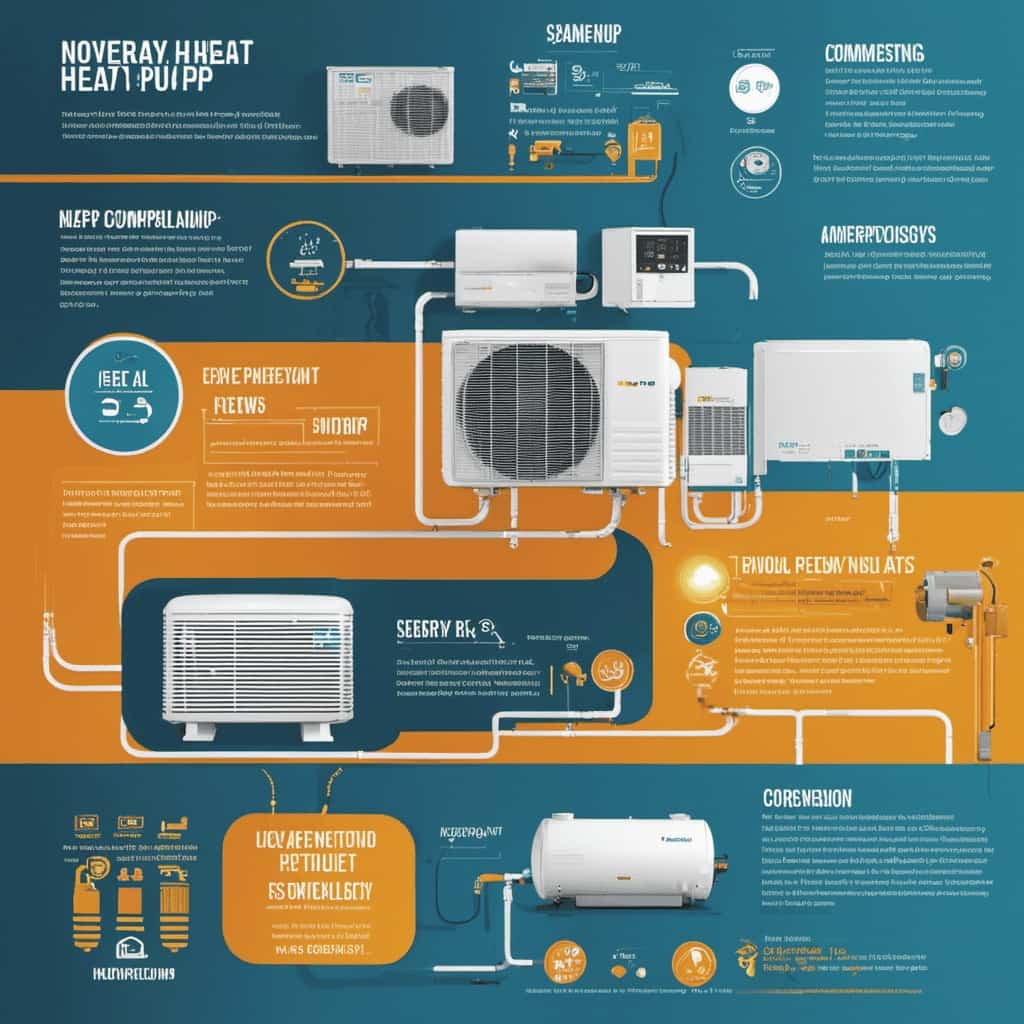
Frequently Asked Questions
How Do I Know if a Heat Pump Is the Right Choice for My Home?
We can determine if a heat pump is right for your home by evaluating its energy efficiency and conducting a cost comparison with other heating options. These steps help us serve you better.
Can I Install a Heat Pump Myself, or Should I Hire a Professional?
We recommend hiring a professional for heat pump installation. While DIY heat pump installation may seem tempting, professionals have the expertise to ensure proper installation, optimize efficiency, and minimize potential risks or complications.
What Kind of Maintenance Does a Heat Pump Require, and How Often Should It Be Done?
Heat pump maintenance is crucial for optimal performance. Regular inspections, filter cleaning or replacement, and coil cleaning are essential. Frequency depends on usage and environment. Our team ensures efficient and timely maintenance.
Are There Any Safety Considerations to Keep in Mind During the Installation Process?
Safety precautions and installation challenges are important aspects to consider during the heat pump installation process. We must prioritize safety by following proper procedures and addressing any potential risks to ensure a successful and efficient installation.

How Long Can I Expect a Heat Pump to Last Before Needing Replacement?
Heat pumps typically last between 10 to 15 years before needing replacement. Signs of heat pump replacement include decreased efficiency, frequent breakdowns, and increased energy bills. Regular maintenance can help extend the lifespan.
Conclusion
After following the four essential steps for efficient heat pump installation, we can confidently say that we’ve laid a solid foundation for optimal performance and energy efficiency.
Just like a well-oiled machine, our heat pump system is now poised to deliver seamless comfort and savings.
By regularly maintaining and monitoring this system, we can ensure its longevity and continue to enjoy the benefits it brings.

Let’s keep this heat pump running like a finely-tuned instrument, orchestrating comfort and efficiency in perfect harmony.
Energy Efficiency
Reliable Heat Pumps: Energy Efficiency for a Greener Planet

Imagine a world where we can stay warm without harming our planet. At Reliable Heat Pumps, we believe in making that vision a reality. With our energy-efficient technology, we can enjoy the cozy comfort we crave while reducing our carbon footprint.
In this article, we’ll explore the importance of energy efficiency ratings, understand heat pump efficiency metrics, and compare the environmental impact of different heat pumps.
Join us on our journey towards a greener planet.
Key Takeaways
- Energy efficiency ratings of heat pumps measure their effectiveness in converting energy into heat or cool air, with higher ratings indicating greater energy and cost savings.
- Investing in an energy-efficient heat pump can reduce carbon footprint and lower energy bills over time.
- Regular maintenance, proper insulation, choosing the right size, and strategic placement of heat pumps are factors that influence energy efficiency.
- By comparing energy efficiency ratings such as SEER and HSPF, consumers can make informed decisions to choose heat pumps that provide optimal comfort and reduce energy consumption.
The Importance of Energy Efficiency Ratings
We believe that when it comes to heat pumps, understanding and prioritizing energy efficiency ratings is crucial for a greener planet.

Energy efficiency ratings measure the effectiveness of a heat pump in converting energy into heat or cool air. Higher ratings indicate greater energy savings and cost savings in the long run.
By choosing a heat pump with a high energy efficiency rating, you can reduce your carbon footprint and lower your energy bills. Investing in an energy-efficient heat pump not only benefits the environment but also saves you money over time.
With advancements in technology, heat pumps are becoming increasingly efficient, offering better performance while consuming less energy.
Understanding Heat Pump Efficiency Metrics
Understanding heat pump efficiency metrics is essential for evaluating the performance and energy-saving potential of different models. When it comes to heat pump performance, maximizing energy savings is a top priority for many homeowners. By understanding efficiency metrics, you can make informed decisions that won’t only save you money but also contribute to a greener planet.
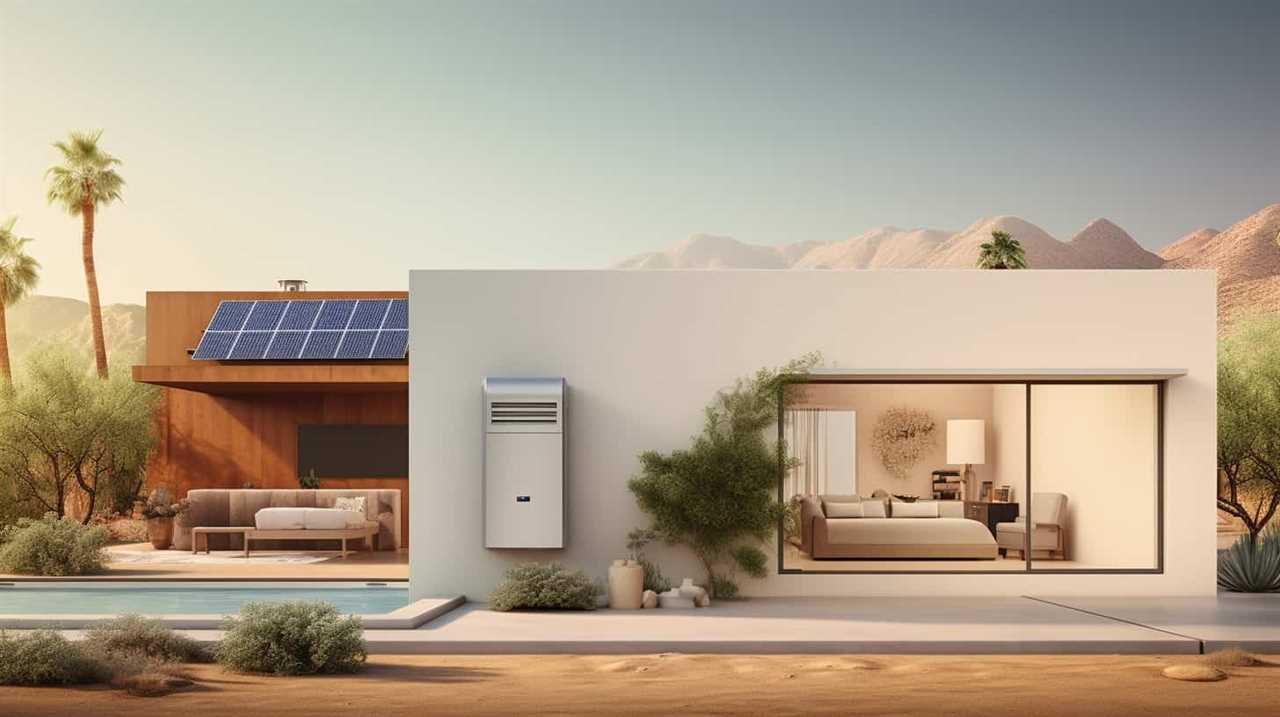
There are several key metrics to consider when evaluating the efficiency of a heat pump. The first is the Seasonal Energy Efficiency Ratio (SEER), which measures the cooling efficiency of the unit. The higher the SEER rating, the more energy efficient the heat pump is. Another important metric is the Heating Seasonal Performance Factor (HSPF), which measures the heating efficiency of the unit. Again, a higher HSPF rating indicates a more efficient heat pump.
Factors Influencing Heat Pump Energy Efficiency
To achieve optimal heat pump energy efficiency, it is important to consider the factors that influence its performance. Heat pump maintenance plays a crucial role in optimizing heat pump performance. Regular maintenance, such as cleaning and replacing filters, lubricating moving parts, and checking refrigerant levels, ensures that the heat pump operates at its peak efficiency. Additionally, proper insulation and sealing of ductwork can prevent energy loss and improve overall efficiency. Another factor to consider is the size of the heat pump. A unit that is too small will struggle to heat or cool a space efficiently, while an oversized unit may cycle on and off frequently, wasting energy. Finally, the location of the heat pump is important. Placing it in a shaded area and away from obstructions can help it operate more efficiently. By considering these factors and investing in regular maintenance, homeowners can maximize heat pump energy efficiency and reduce their environmental impact.
| Factors Influencing Heat Pump Energy Efficiency | |
|---|---|
| Heat Pump Maintenance | Regular cleaning and maintenance ensure optimal performance. |
| Proper Insulation | Insulating ductwork prevents energy loss. |
| Correct Sizing | Choosing the right size heat pump ensures efficient operation. |
| Placement | A shaded area and unobstructed location improve efficiency. |
Comparing Energy Efficiency Ratings of Heat Pumps
Comparing energy efficiency ratings of heat pumps allows us to determine their effectiveness in conserving energy. When evaluating heat pump performance, it’s crucial to consider their energy consumption.
Energy efficiency ratings, such as the Seasonal Energy Efficiency Ratio (SEER) and Heating Seasonal Performance Factor (HSPF), provide valuable insights into the efficiency of heat pumps. The SEER rating measures the cooling efficiency, while the HSPF rating indicates the heating efficiency of the system. Higher ratings indicate better energy efficiency and lower energy consumption.

By comparing these ratings, consumers can make informed decisions and choose heat pumps that won’t only provide optimal comfort but also help reduce energy bills and minimize environmental impact.
Environmental Impact of Energy Efficient Heat Pumps
As we explore the environmental impact of energy efficient heat pumps, it is important to consider their contribution to reducing greenhouse gas emissions. These heat pumps not only provide efficient heating and cooling, but also help to minimize our carbon footprint.
When evaluating the environmental impact of heat pumps, it is crucial to consider their life cycle. This includes the production, use, and disposal of the equipment. Energy efficient heat pumps generally have a lower carbon footprint compared to traditional heating systems, as they operate on electricity rather than burning fossil fuels.
To further illustrate the environmental benefits, let’s take a look at the following table:
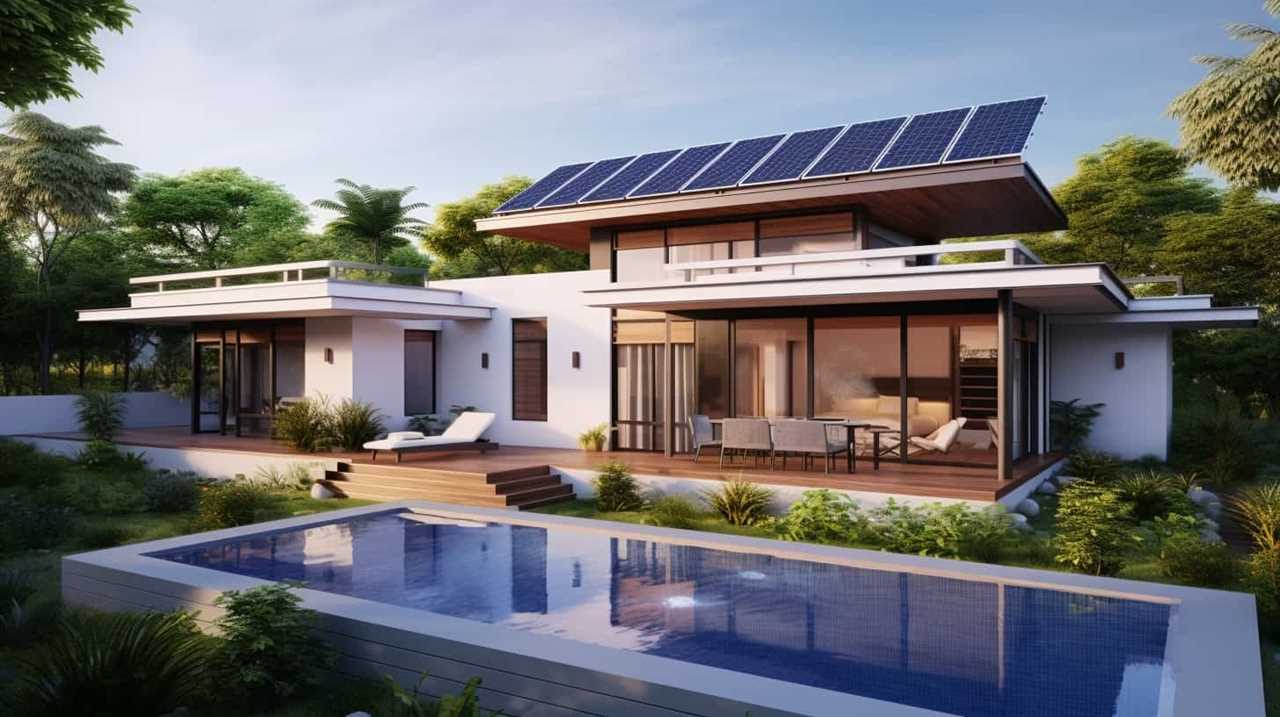
| Environmental Impact | Energy Efficient Heat Pumps | Traditional Heating Systems |
|---|---|---|
| Carbon Footprint | Lower | Higher |
| Greenhouse Gas Emissions | Reduced | Increased |
Frequently Asked Questions
How Does the Size of a Heat Pump Affect Its Energy Efficiency?
When it comes to heat pump size, it directly affects energy efficiency. A properly sized heat pump ensures optimal performance and reduces energy waste. So, choosing the right size is crucial for a greener and more efficient planet.
What Are the Maintenance Requirements for Maintaining the Energy Efficiency of a Heat Pump?
To maintain energy efficient heat pump operation, regular maintenance is required. This includes cleaning or replacing air filters, checking and cleaning coils, and ensuring proper airflow. Don’t neglect the importance of maintenance for a greener planet!
Are There Any Government Incentives or Rebates Available for Purchasing Energy-Efficient Heat Pumps?
Yes, there are government incentives and rebates available for purchasing energy-efficient heat pumps. These incentives can help offset the initial cost of the heat pump and provide long-term energy savings for a greener planet.
Can a Heat Pump Be Used for Both Heating and Cooling Purposes?
Yes, a heat pump can be used for both heating and cooling. It utilizes heat pump technology to transfer heat from one area to another, offering the benefits of energy efficiency. However, there are some drawbacks to consider as well.

How Does the Location or Climate of a Home Affect the Energy Efficiency of a Heat Pump?
Location impact and climate effect the energy efficiency of heat pumps. The specific location and climate of a home determine how well a heat pump can efficiently heat or cool a space, making it crucial to consider these factors when choosing a heat pump.
Conclusion
In conclusion, investing in reliable heat pumps with high energy efficiency ratings is crucial for creating a greener planet. These heat pumps not only save energy and reduce utility bills, but also minimize environmental impact.
By envisioning a world where energy efficient heat pumps are widely adopted, we can picture cleaner air, less pollution, and a healthier planet for future generations.
Let’s take action and choose heat pumps that prioritize energy efficiency for a brighter and more sustainable future.
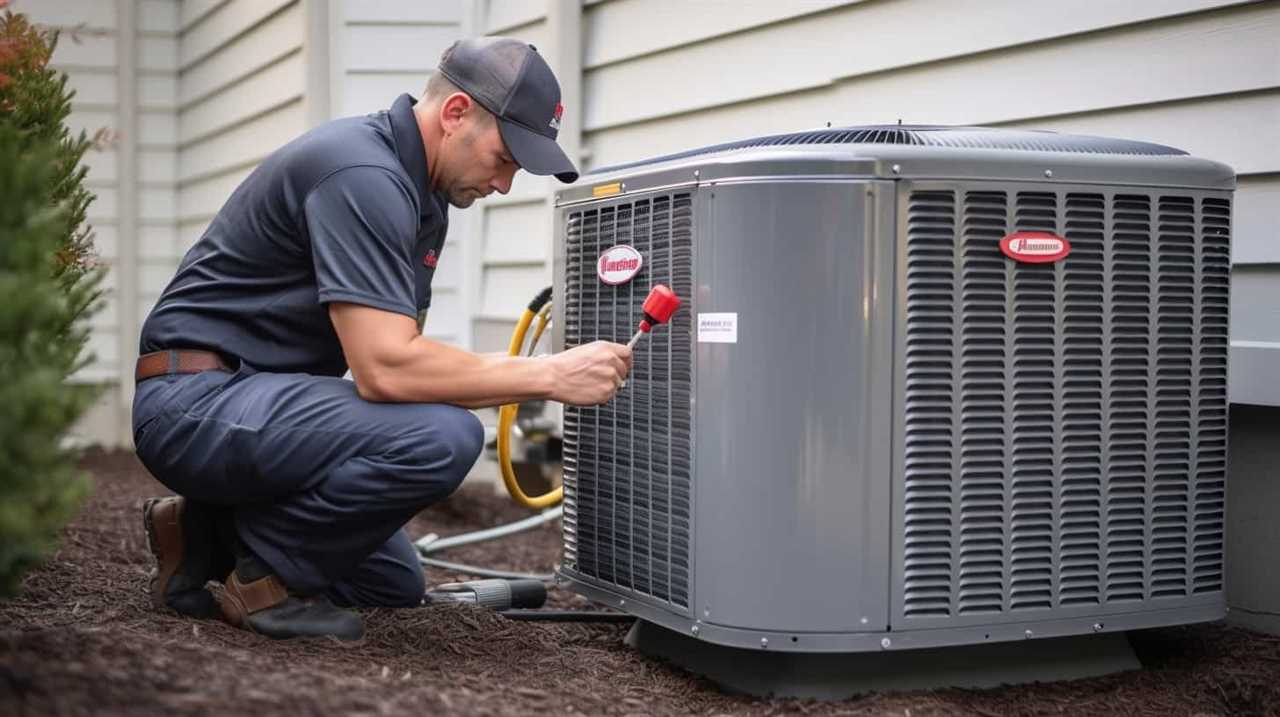
Energy Efficiency
Slash Energy Bills: Mystery of Efficient Heat Pumps

We’ve all been there – dreading the arrival of our energy bills, wondering how we can possibly reduce our consumption without sacrificing comfort.
But what if there was a solution? Enter efficient heat pumps, the mysterious technology that promises to slash those bills and keep us cozy.
In this article, we’ll delve into the secrets behind these energy-saving wonders, exploring their technology, benefits, and cost-saving potential.
Get ready to unlock the mystery and take control of your energy consumption.
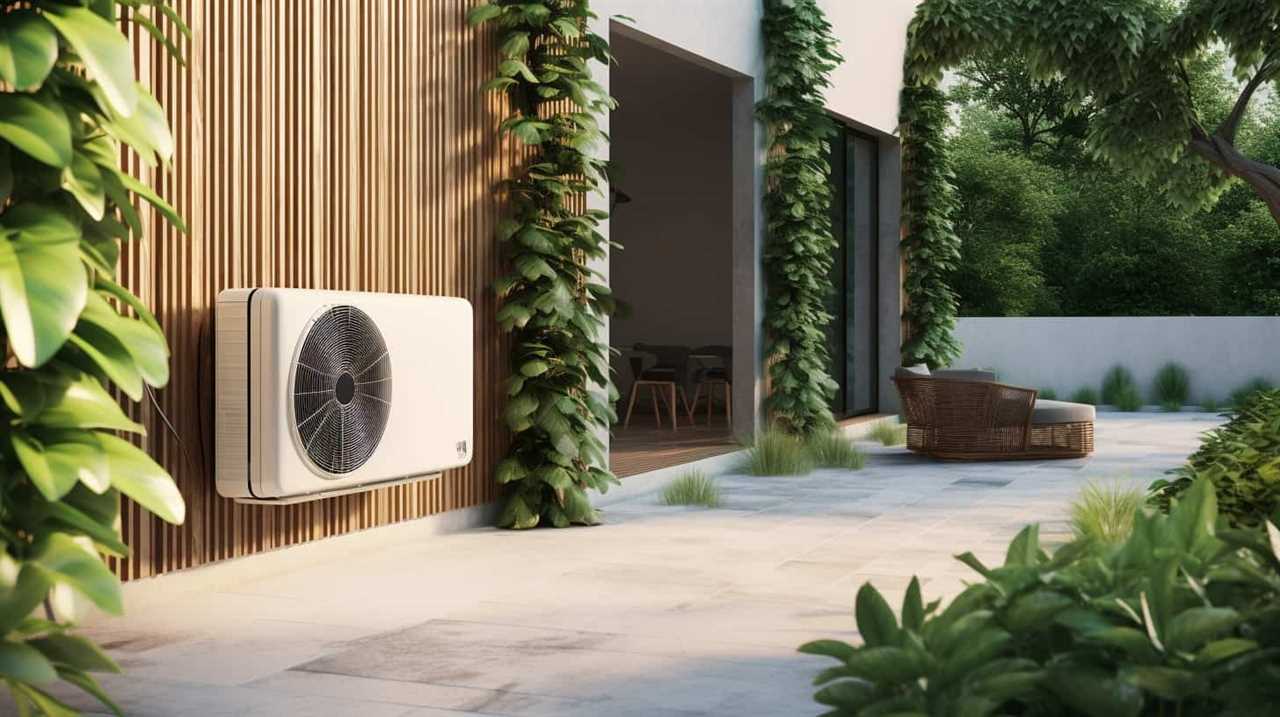
Key Takeaways
- Efficient heat pumps reduce energy consumption by utilizing advanced technology to transfer heat from one area to another.
- They help reduce carbon footprint by relying less on burning fossil fuels and require less energy compared to generating heat from scratch.
- Efficient heat pumps operate at higher efficiency levels, converting more energy into heat, which helps homeowners save money on energy bills and reduce environmental impact.
- Upgrading to an efficient heat pump system can result in reduced carbon footprint and lower greenhouse gas emissions, increased home comfort, and the ability for homeowners to control and customize temperature settings.
How Do Efficient Heat Pumps Reduce Energy Consumption
We can explain how efficient heat pumps reduce energy consumption by utilizing advanced technology and optimizing the transfer of heat from one area to another. By doing so, these heat pumps play a crucial role in reducing carbon footprint and increasing home comfort.
Unlike traditional heating systems that rely on burning fossil fuels, efficient heat pumps work by transferring heat from the air, ground, or water into the home, depending on the type of pump. This process requires significantly less energy compared to generating heat from scratch.
Additionally, efficient heat pumps are designed to operate at higher efficiency levels, meaning they convert more energy into heat. This helps homeowners save money on their energy bills while also reducing their environmental impact.
Understanding the technology behind efficient heat pumps will further demonstrate their potential in revolutionizing home heating systems.
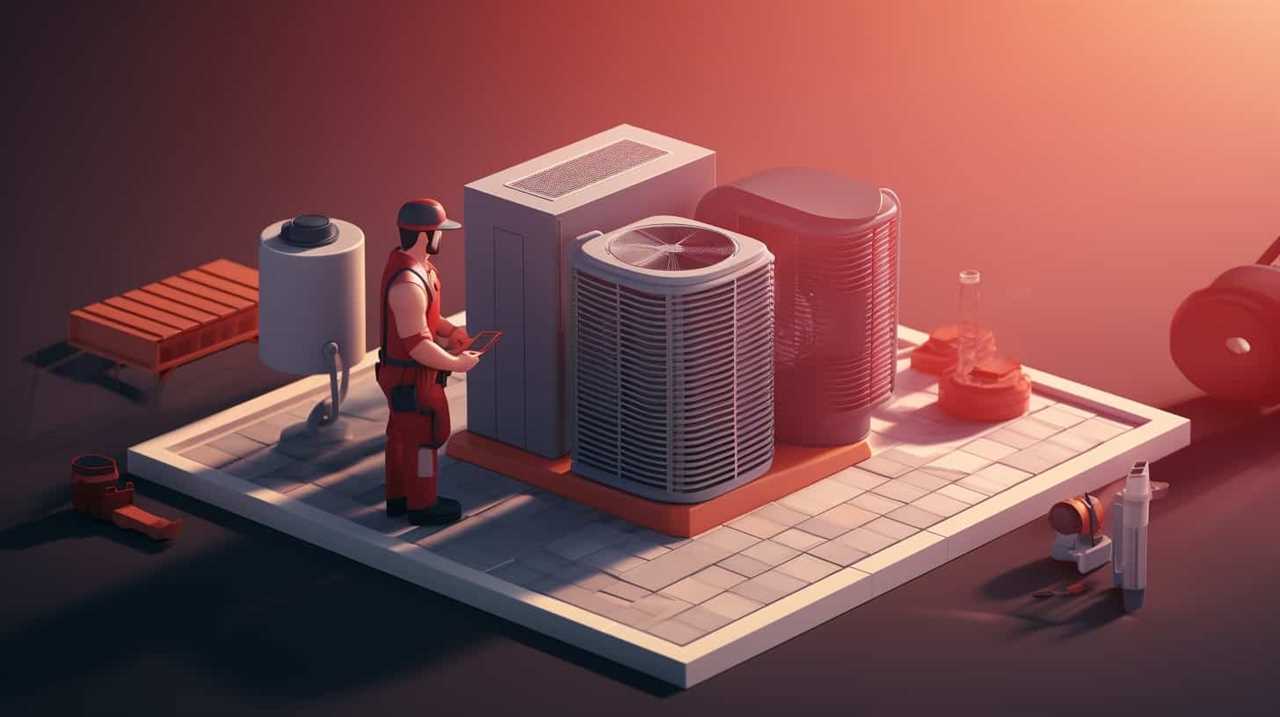
Understanding the Technology Behind Efficient Heat Pumps
By understanding the technology behind efficient heat pumps, we can gain insight into how this innovative system maximizes energy savings and improves home heating. Heat pump operation relies on the principles of thermodynamics and the refrigeration cycle. Here are the key elements to consider:
- Compressor: The heart of the heat pump, it increases the pressure and temperature of the refrigerant.
- Evaporator: Absorbs heat from the outside air or ground, causing the refrigerant to evaporate into a gas.
- Condenser: Releases heat into the home as the refrigerant condenses back into a liquid.
- Expansion valve: Regulates the flow of refrigerant, controlling the system’s efficiency.
Energy-saving features of efficient heat pumps include:
- Variable-speed motors: Adjust the compressor and blower speeds to match the heating or cooling needs, reducing energy waste.
- Smart thermostats: Optimize temperature settings based on occupancy and weather conditions, further enhancing energy efficiency.
Understanding these technological aspects is crucial for homeowners seeking to capitalize on energy savings with efficient heat pumps.
Benefits of Upgrading to an Efficient Heat Pump System
When upgrading to an efficient heat pump system, it’s important to consider the many benefits it can provide. One major advantage is the reduced carbon footprint. Heat pumps use electricity to transfer heat rather than burning fossil fuels, resulting in lower greenhouse gas emissions. By using renewable energy sources to power heat pumps, such as solar or wind, homeowners can further reduce their carbon footprint.
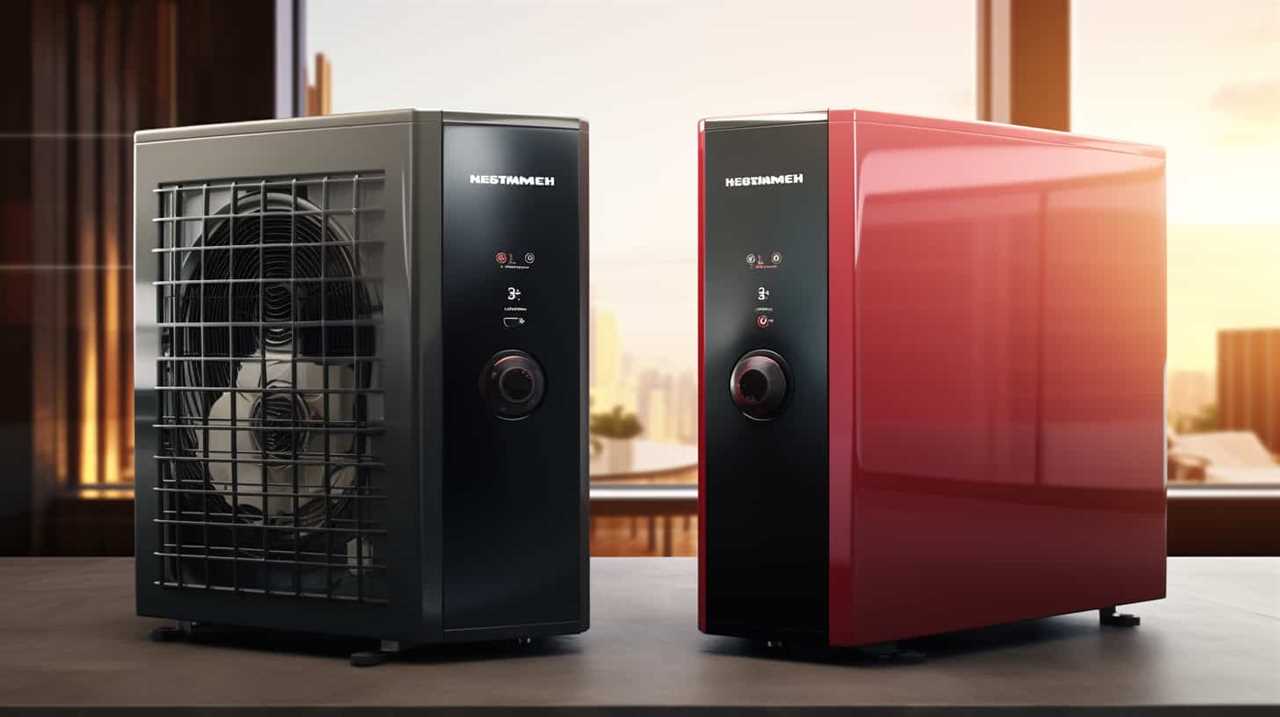
Another benefit of upgrading to an efficient heat pump system is increased home comfort. Heat pumps provide both heating and cooling capabilities, ensuring a comfortable indoor environment all year round. They’re also known for their ability to maintain a consistent temperature, eliminating hot or cold spots in the home. Additionally, heat pumps operate quietly and have advanced features like programmable thermostats, allowing homeowners to control and customize the temperature settings according to their preferences.
Tips for Optimizing the Energy Efficiency of Heat Pumps
To maximize the energy efficiency of our heat pumps, it’s essential to regularly maintain and clean the system. Here are some tips to help you optimize the energy efficiency of your heat pumps:
-
Regularly clean or replace air filters: Dirty filters can restrict airflow and cause the system to work harder, reducing its efficiency. Clean or replace the filters every 1-3 months.
-
Keep outdoor units clear: Ensure that there are no obstructions around the outdoor unit, such as leaves, debris, or tall grass. This allows for proper airflow and prevents the system from overworking.
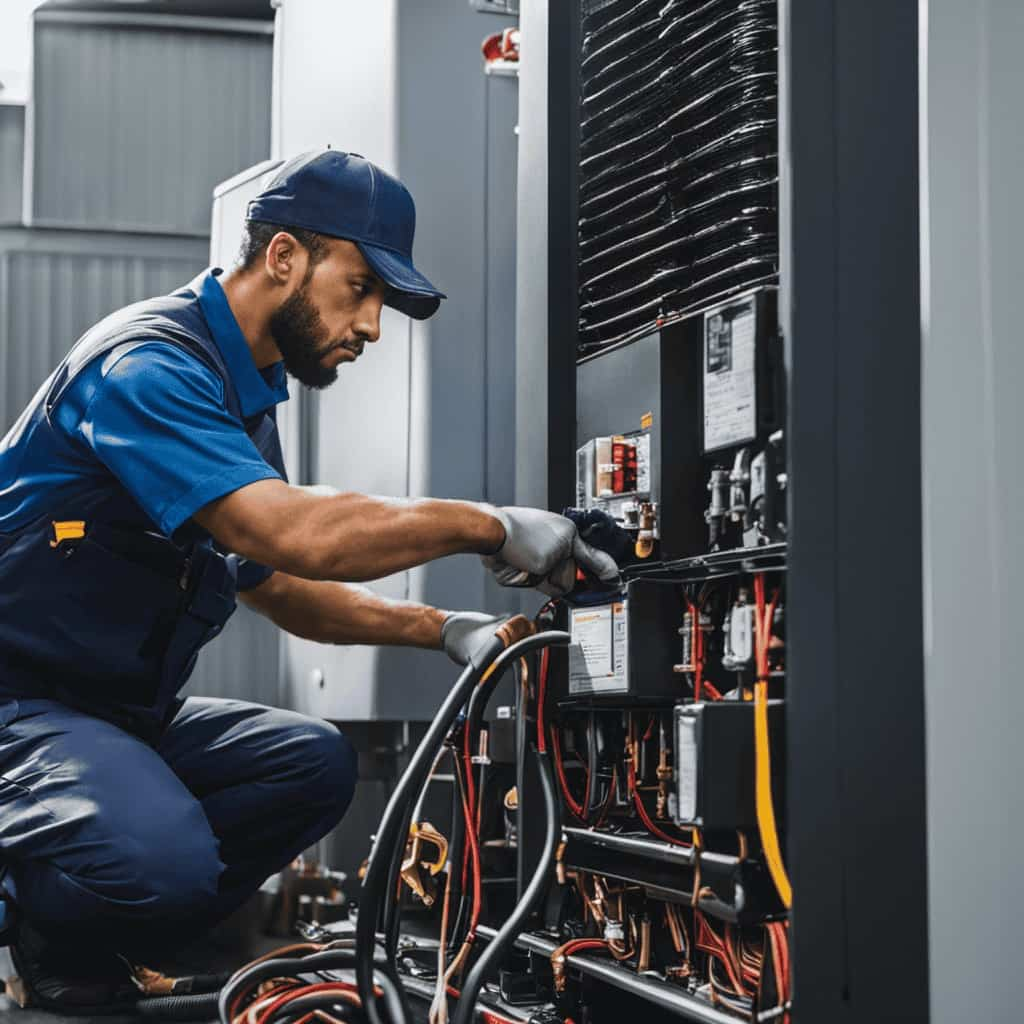
-
Set the optimal temperature: Keep the thermostat set at an optimal temperature to reduce energy consumption. Lower the temperature in winter and raise it in summer when away from home.
-
Utilize energy-saving techniques: Make use of features such as programmable thermostats to schedule temperature adjustments based on your daily routine. Additionally, consider using zone heating or cooling to direct airflow only to occupied areas.
Exploring the Cost-Saving Potential of Efficient Heat Pumps
Our research reveals the significant cost-saving potential of efficient heat pumps. By utilizing advanced technology and optimizing energy consumption, these heat pumps offer substantial savings on energy bills.
Efficient heat pumps are designed to minimize energy consumption while maximizing heat transfer, resulting in reduced energy costs. These pumps are equipped with features such as variable-speed compressors, which adjust their output based on the heating or cooling demand, further reducing energy usage. Additionally, advanced insulation and improved sealing mechanisms prevent heat loss, ensuring maximum efficiency.

Frequently Asked Questions
Are Efficient Heat Pumps Only Suitable for Certain Types of Homes or Buildings?
Efficient heat pumps can be suitable for various homes or buildings. The efficient heat pump installation process and factors to consider when choosing one depend on the specific requirements and energy needs of the property.
How Long Does It Typically Take to Recoup the Cost of Upgrading to an Efficient Heat Pump System?
It typically takes several years to recoup the cost of upgrading to an efficient heat pump system. However, the energy savings over time can help offset the initial investment and provide long-term financial benefits.
Can Efficient Heat Pumps Be Used in Both Hot and Cold Climates?
In both hot and cold climates, efficient heat pumps can be a game-changer. They outperform traditional heating systems in terms of efficiency, saving us money while keeping us comfortable. Climate does impact their efficiency, but they still offer significant energy savings.
Are There Any Government Incentives or Rebates Available for Installing Efficient Heat Pumps?
Government incentives and energy efficiency programs are available for installing efficient heat pumps. These programs aim to reduce energy consumption and promote the use of renewable energy sources, offering financial benefits to homeowners and businesses.

What Maintenance Is Required to Keep an Efficient Heat Pump System Running Optimally?
Regular heat pump maintenance is crucial for optimal performance. Servicing includes cleaning filters, checking refrigerant levels, inspecting electrical connections, and lubricating moving parts. This ensures energy efficiency and extends the lifespan of the system.
Conclusion
So there you have it, folks. Efficient heat pumps are like the superheroes of energy consumption, slashing those pesky bills with their incredible technology.
Upgrading to one of these bad boys won’t only save you money, but also make your home more energy efficient. And hey, who doesn’t want to optimize their energy efficiency?
So go ahead, explore the cost-saving potential of efficient heat pumps and watch your bills shrink faster than a melting ice cube.
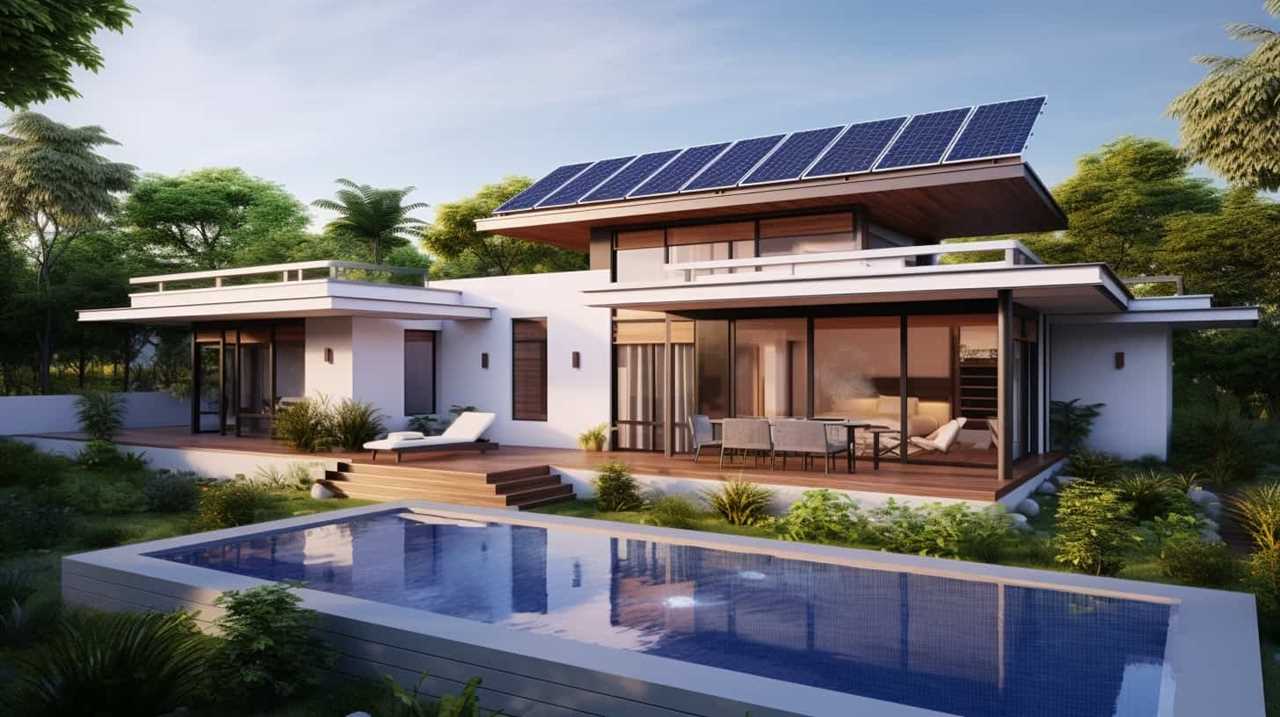
It’s a win-win situation, my friends.
Energy Efficiency
Green Advantage: Heat Pump Efficiency Cuts Environmental Damage

We’ve all felt the sweltering heat of summer or the bone-chilling cold of winter. But did you know that our traditional heating and cooling systems are wreaking havoc on the environment?
That’s where heat pump efficiency comes in. With its ability to reduce energy consumption and emissions, heat pumps have become an essential tool in combating climate change.
In this article, we’ll explore how heat pump efficiency can cut environmental damage and provide tips on maximizing its benefits. So let’s dive in and harness the green advantage!
Key Takeaways
- Traditional heating and cooling systems heavily rely on fossil fuels, contributing significantly to carbon emissions and exacerbating climate change.
- Heat pump efficiency ratings, such as SEER and HSPF, indicate greater energy efficiency and lower operating costs. Energy Star certification guarantees the heat pump meets strict efficiency standards.
- Heat pumps reduce energy consumption and emissions of traditional HVAC systems by extracting heat from air, ground, or water, requiring less energy compared to conventional heating methods.
- Maximizing heat pump efficiency and minimizing environmental damage can be achieved through regular maintenance, proper insulation and sealing of homes, utilizing programmable thermostats and zoning systems, and integrating renewable energy sources like solar panels.
The Environmental Impact of Traditional Heating and Cooling Systems
We can clearly see the damaging effects of traditional heating and cooling systems on the environment. These systems, which heavily rely on fossil fuels, contribute significantly to carbon emissions, exacerbating climate change.
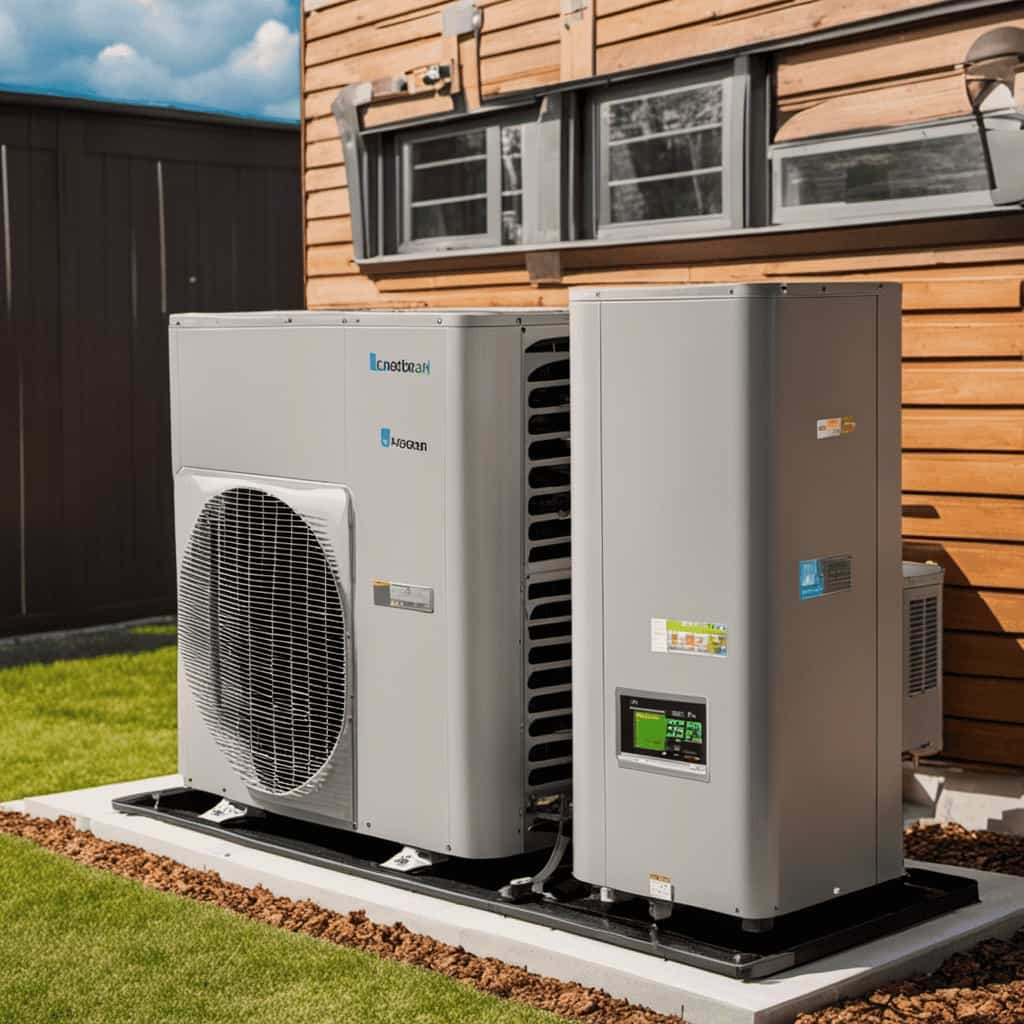
According to data from the U.S. Environmental Protection Agency (EPA), residential and commercial buildings account for 12% of greenhouse gas emissions in the United States. The burning of fossil fuels for heating alone contributes to approximately 10% of global CO2 emissions. This highlights the urgent need to transition to more sustainable heating alternatives.
By adopting heat pump technology, we can reduce our carbon footprint and mitigate environmental damage. Heat pumps utilize renewable energy sources such as air, water, or geothermal heat, providing efficient and environmentally-friendly heating and cooling solutions.
With their high energy efficiency and potential for using renewable energy, heat pumps offer a promising pathway towards sustainable heating.
Understanding Heat Pump Efficiency Ratings
Occasionally, heat pump efficiency ratings can be confusing, but understanding them is crucial for choosing the right system for your needs. Heat pump technology offers energy efficient heating and cooling solutions, making it an attractive option for environmentally conscious individuals.
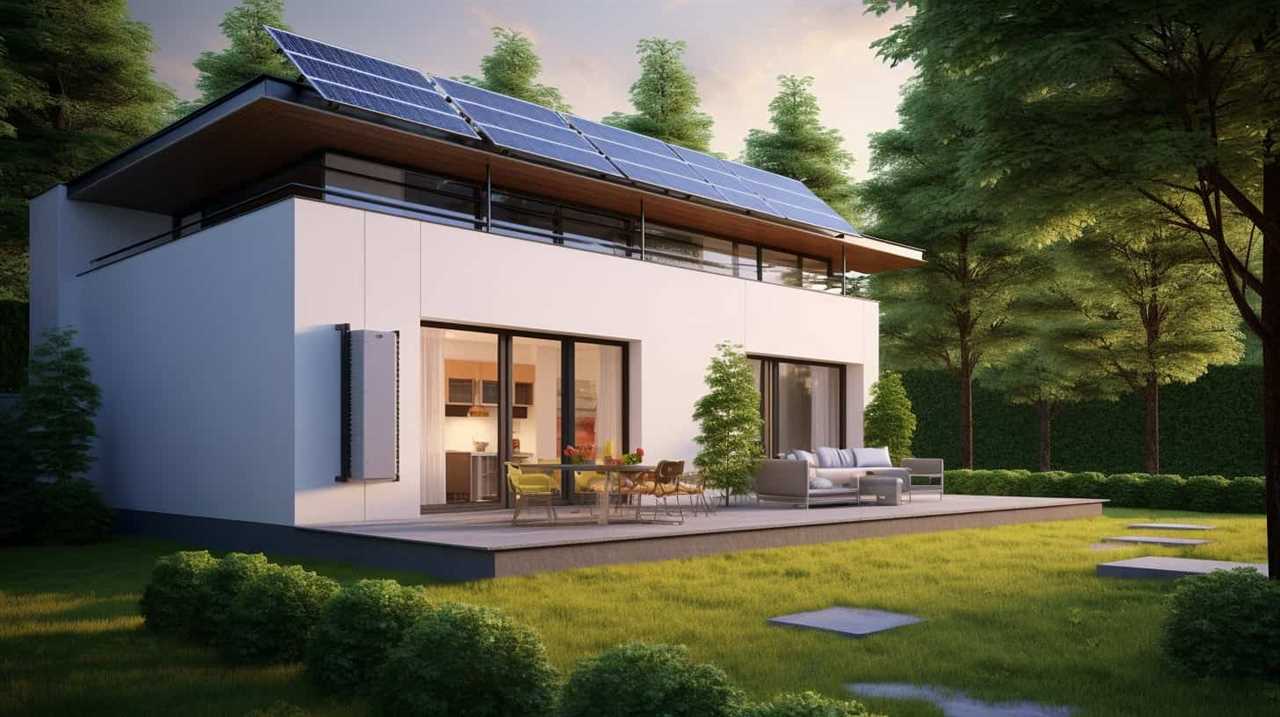
When evaluating the efficiency of a heat pump, it’s important to consider its Seasonal Energy Efficiency Ratio (SEER) and Heating Season Performance Factor (HSPF). SEER measures the cooling efficiency of the system, while HSPF measures its heating efficiency. A higher SEER or HSPF rating indicates greater energy efficiency and lower operating costs.
Additionally, it’s essential to understand the Energy Star certification, which guarantees that the heat pump meets strict efficiency standards. By familiarizing yourself with these ratings and certifications, you can make an informed decision and maximize the energy efficiency of your heating system.
How Heat Pumps Reduce Energy Consumption and Emissions
Reducing energy consumption and emissions, heat pumps offer an environmentally friendly solution for heating and cooling. By maximizing savings and utilizing advanced heat pump technology, these systems significantly reduce the environmental impact of traditional HVAC systems. Heat pumps achieve this by extracting heat from the air, ground, or water, and transferring it to the desired space. This process requires less energy compared to conventional heating methods, resulting in lower energy consumption and reduced emissions.
To illustrate the efficiency of heat pumps, consider the following table:
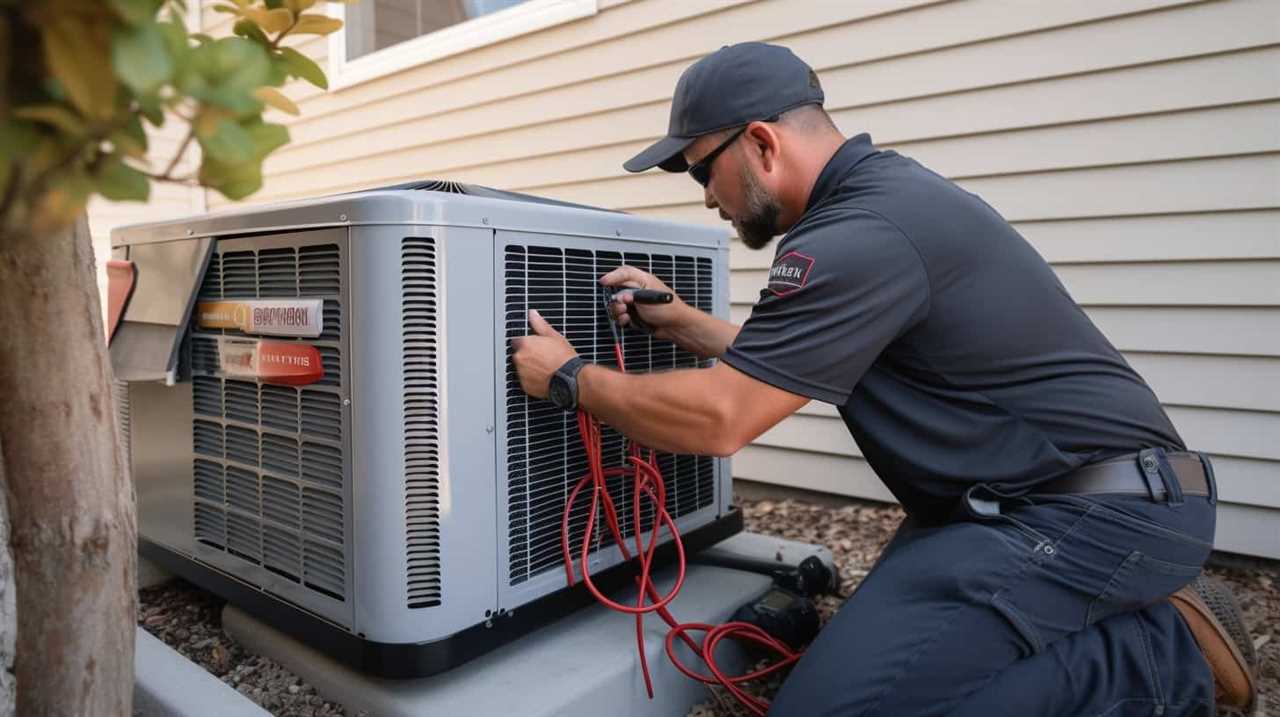
| Heating Method | Efficiency Rating |
|---|---|
| Heat Pump | 300-400% |
| Electric Furnace | 100% |
| Gas Furnace | 90% |
As the table shows, heat pumps can achieve an impressive efficiency rating of 300-400%, meaning they produce 3-4 units of heat for every unit of electricity consumed. In contrast, electric and gas furnaces have lower efficiency ratings, resulting in higher energy consumption and emissions. By choosing heat pump technology, individuals can enjoy both cost savings and a reduced environmental footprint.
The Role of Heat Pump Efficiency in Combatting Climate Change
Heat pump efficiency plays a crucial role in mitigating climate change by reducing greenhouse gas emissions. The advancements in heat pump technology have significantly improved their efficiency, resulting in lower energy consumption and fewer emissions. Government incentives for heat pump installation have further encouraged the adoption of this technology, leading to widespread usage and greater environmental benefits.
The following points highlight the deeper significance of heat pump efficiency in combatting climate change:
-
Enhanced energy efficiency: Heat pumps now have higher coefficients of performance (COP), meaning they can provide more heat or cooling for the same amount of energy input.

-
Reduced reliance on fossil fuels: By efficiently transferring heat from one place to another, heat pumps minimize the need for burning fossil fuels, which are major contributors to greenhouse gas emissions.
-
Decreased carbon footprint: The use of heat pumps helps to reduce carbon dioxide emissions, as they produce significantly fewer greenhouse gases compared to traditional heating and cooling systems.
Understanding the importance of heat pump efficiency sets the stage for maximizing their benefits and minimizing environmental damage.
Tips for Maximizing Heat Pump Efficiency and Minimizing Environmental Damage
To achieve optimal results and minimize harm to the environment, we need to implement practical tips for maximizing heat pump efficiency. By following these guidelines, we can’t only save energy but also reduce our carbon footprint.
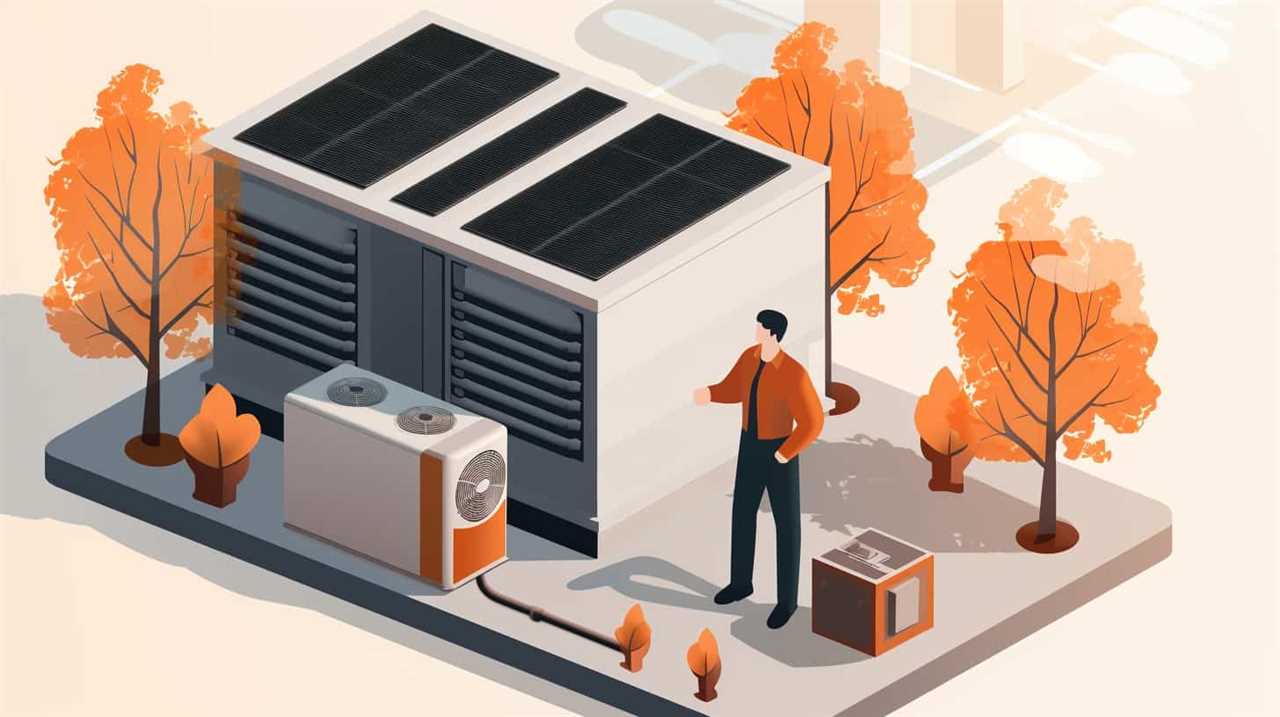
Firstly, it’s crucial to properly size and install the heat pump system to ensure efficient operation. This involves considering factors such as building size, insulation, and climate conditions.
Regular maintenance is also essential, including cleaning or replacing filters, checking refrigerant levels, and inspecting ductwork for leaks.
Additionally, utilizing programmable thermostats and setting temperature schedules can help maximize energy savings.
Lastly, integrating the heat pump with renewable energy sources, such as solar panels, can further reduce environmental impact.

Frequently Asked Questions
Are Heat Pumps Suitable for All Types of Climates?
Heat pump efficiency varies depending on the climate. While heat pumps are generally suitable for most climates, extreme cold or hot regions may require additional measures to ensure optimal performance.
What Is the Average Lifespan of a Heat Pump?
Heat pump maintenance is crucial for maximizing the average lifespan of a heat pump. Regular servicing and cleaning can ensure optimal performance and energy efficiency, reducing environmental damage and providing a greener advantage.
Can Heat Pumps Be Used for Both Heating and Cooling?
Yes, heat pumps can be used for both heating and cooling. This is a result of the advanced heat pump technology that allows for efficient transfer of heat in both directions, maximizing energy efficiency.
How Does the Cost of Installing a Heat Pump Compare to Traditional Heating and Cooling Systems?
Cost comparison between heat pumps and traditional systems shows long term savings. Heat pumps are more efficient, reducing energy consumption and lowering utility bills. Installation costs may be higher, but the savings over time outweigh the initial investment.
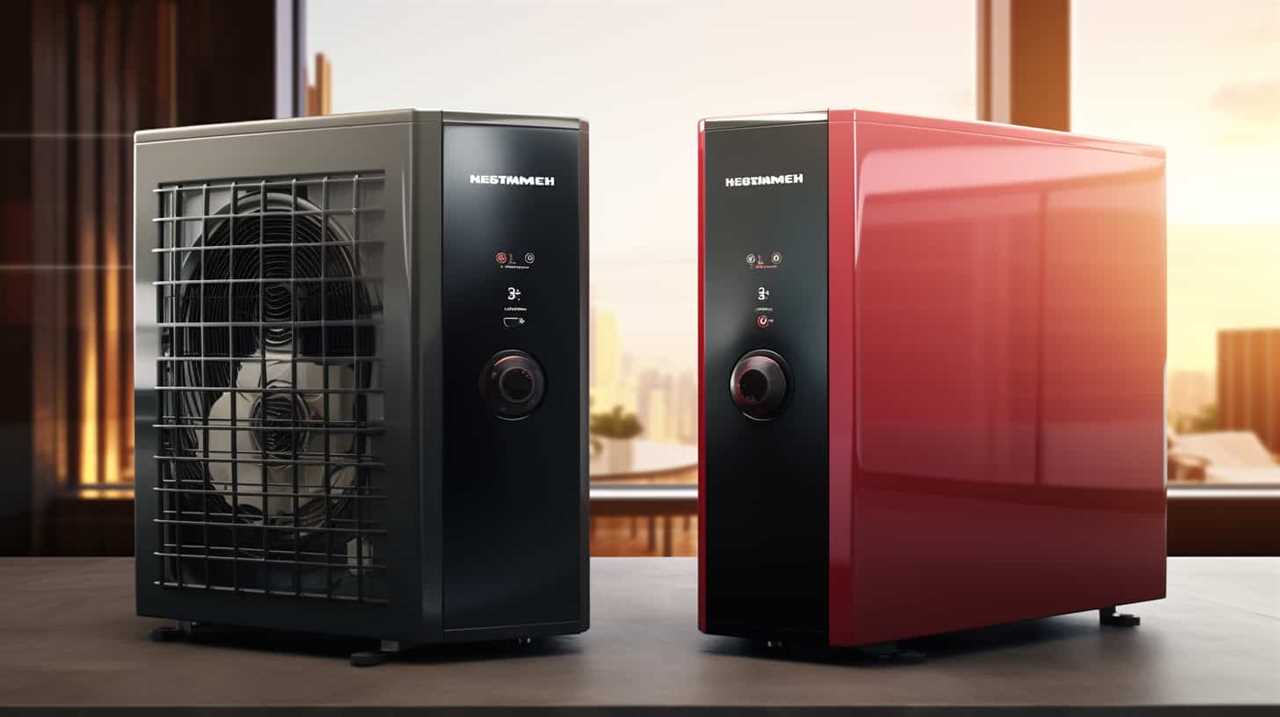
Are There Any Government Incentives or Rebates Available for Installing a Heat Pump?
Yes, there are government incentives and rebates available for installing a heat pump. These programs aim to promote energy efficiency and reduce environmental damage. Take advantage of these opportunities to save money and contribute to a greener future.
Conclusion
In conclusion, heat pumps offer a green advantage by significantly reducing environmental damage caused by traditional heating and cooling systems. With their high efficiency ratings, heat pumps minimize energy consumption and emissions, playing a vital role in combatting climate change.
To maximize heat pump efficiency and further minimize environmental impact, implementing simple tips such as regular maintenance and proper insulation is crucial.
By embracing heat pump technology, we can make a data-driven, analytical choice to protect our environment and create a sustainable future.
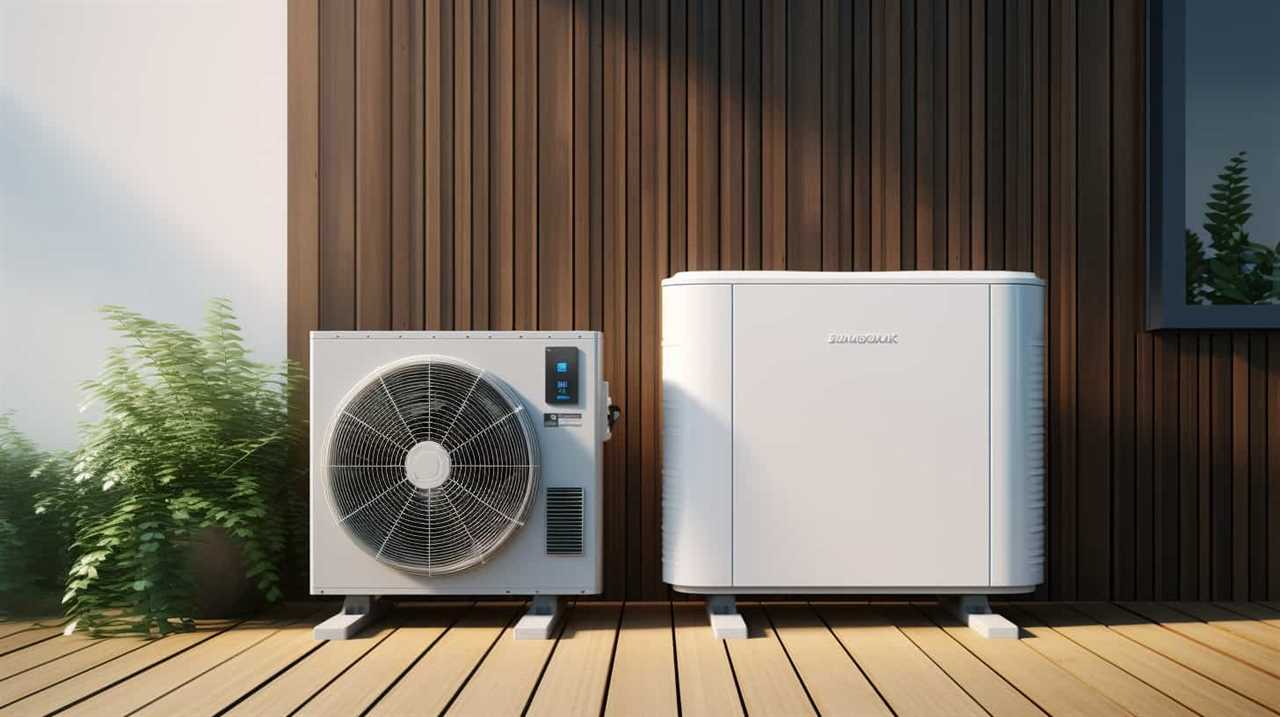
-

 Residential and Commercial Applications1 week ago
Residential and Commercial Applications1 week agoBest Amana Heat Pump Reviews
-

 Thermal Energy Transfer2 weeks ago
Thermal Energy Transfer2 weeks agoBreakthroughs in Modern Heat Pump Systems: Thermal Energy Edition
-

 Residential and Commercial Applications1 week ago
Residential and Commercial Applications1 week agoBest Heat Pump
-

 Geothermal Heat Pumps3 months ago
Geothermal Heat Pumps3 months agoUpgrade Your Comfort with Our Efficient HVAC Systems
-

 Air Conditioning2 months ago
Air Conditioning2 months agoExploring Energy-Efficient Air Conditioning Heat Pumps
-

 Geothermal Heat Pumps3 months ago
Geothermal Heat Pumps3 months agoInnovative Geothermal Heat Pump Manufacturers Revolutionize Energy Efficiency
-

 Thermal Energy Transfer1 month ago
Thermal Energy Transfer1 month agoBoost Your Heat Pump Efficiency: Interactive Guide
-

 Residential and Commercial Applications1 week ago
Residential and Commercial Applications1 week agoBest Portable Heat Pump Heat & AC










